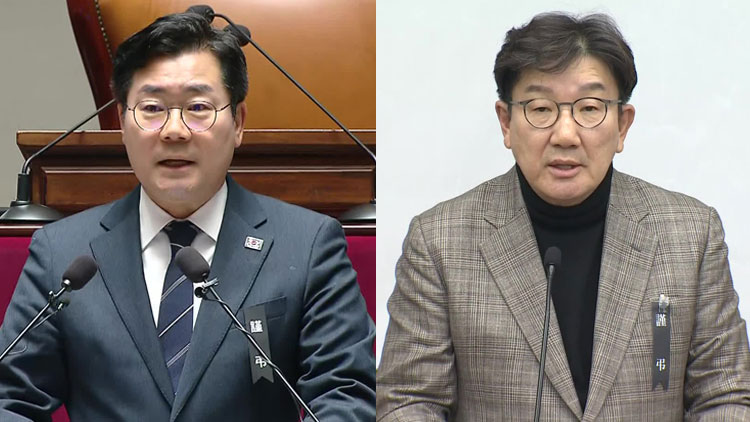Tasks for Korean automobile industry: overcoming three challenges
입력 2025.01.02 (00:36)
읽어주기 기능은 크롬기반의
브라우저에서만 사용하실 수 있습니다.
[Anchor]
The situation is also challenging for automobiles, South Korea's key export item, due to changes in the global market and the United States' protectionist policies.
Reporter Kim Ji-sook has investigated the tasks our automotive industry must address this year.
[Report]
Narrow parking space.
["I will switch to crab (parallel parking) mode."]
The wheels turn and it parks perfectly.
A warning sound goes off as I close my eyes, seemingly sleepy.
This is a technology developed to expand into overseas markets.
[Lee Seung-hwan/Head of Converged Advanced Research at Hyundai Mobis: "We are thinking about how to combine our capabilities and technologies to provide users with a new experience."]
Last year, exports of Korean cars to the U.S. soared by 11%.
However, the outlook for this year is not entirely bright.
By 2025, it is expected to face a challenge unlike any before, which can be explained by three Cs.
The first C is 'Change'.
In the U.S., the next Trump administration is expected to raise export barriers by abolishing electric vehicle subsidies and increasing tariffs.
[Donald Trump/U.S. President-elect/Dec. 16: "Tariffs will make our country rich."]
In the domestic market, the entry of Chinese companies, considered the world's largest electric vehicle manufacturers, is anticipated.
This construction site is where a Chinese electric vehicle store will open in the country this year.
The second C is China and its push for more affordable electric cars.
Prices of electric cars in China are around 20 million won.
Domestic companies are closely watching whether these low prices will work in the domestic market.
The last C is carbon emissions.
European countries are pressuring that they will not provide subsidies or tax benefits unless carbon emissions are reduced, so measures are needed.
[Cho Cheol/Senior Researcher at the Korea Institute for Industrial Economics and Trade: "There is a need for both companies and the government to accelerate the transition to smart manufacturing for low-cost, high-efficiency, and high-quality production."]
This year presents an unusually high number of challenges.
Experts emphasize the need for a flexible strategy that diversifies export countries and production models while minimizing domestic sluggishness in response to external environments.
KBS News, Kim Ji-sook.
The situation is also challenging for automobiles, South Korea's key export item, due to changes in the global market and the United States' protectionist policies.
Reporter Kim Ji-sook has investigated the tasks our automotive industry must address this year.
[Report]
Narrow parking space.
["I will switch to crab (parallel parking) mode."]
The wheels turn and it parks perfectly.
A warning sound goes off as I close my eyes, seemingly sleepy.
This is a technology developed to expand into overseas markets.
[Lee Seung-hwan/Head of Converged Advanced Research at Hyundai Mobis: "We are thinking about how to combine our capabilities and technologies to provide users with a new experience."]
Last year, exports of Korean cars to the U.S. soared by 11%.
However, the outlook for this year is not entirely bright.
By 2025, it is expected to face a challenge unlike any before, which can be explained by three Cs.
The first C is 'Change'.
In the U.S., the next Trump administration is expected to raise export barriers by abolishing electric vehicle subsidies and increasing tariffs.
[Donald Trump/U.S. President-elect/Dec. 16: "Tariffs will make our country rich."]
In the domestic market, the entry of Chinese companies, considered the world's largest electric vehicle manufacturers, is anticipated.
This construction site is where a Chinese electric vehicle store will open in the country this year.
The second C is China and its push for more affordable electric cars.
Prices of electric cars in China are around 20 million won.
Domestic companies are closely watching whether these low prices will work in the domestic market.
The last C is carbon emissions.
European countries are pressuring that they will not provide subsidies or tax benefits unless carbon emissions are reduced, so measures are needed.
[Cho Cheol/Senior Researcher at the Korea Institute for Industrial Economics and Trade: "There is a need for both companies and the government to accelerate the transition to smart manufacturing for low-cost, high-efficiency, and high-quality production."]
This year presents an unusually high number of challenges.
Experts emphasize the need for a flexible strategy that diversifies export countries and production models while minimizing domestic sluggishness in response to external environments.
KBS News, Kim Ji-sook.
■ 제보하기
▷ 카카오톡 : 'KBS제보' 검색, 채널 추가
▷ 전화 : 02-781-1234, 4444
▷ 이메일 : kbs1234@kbs.co.kr
▷ 유튜브, 네이버, 카카오에서도 KBS뉴스를 구독해주세요!
- Tasks for Korean automobile industry: overcoming three challenges
-
- 입력 2025-01-02 00:36:10

[Anchor]
The situation is also challenging for automobiles, South Korea's key export item, due to changes in the global market and the United States' protectionist policies.
Reporter Kim Ji-sook has investigated the tasks our automotive industry must address this year.
[Report]
Narrow parking space.
["I will switch to crab (parallel parking) mode."]
The wheels turn and it parks perfectly.
A warning sound goes off as I close my eyes, seemingly sleepy.
This is a technology developed to expand into overseas markets.
[Lee Seung-hwan/Head of Converged Advanced Research at Hyundai Mobis: "We are thinking about how to combine our capabilities and technologies to provide users with a new experience."]
Last year, exports of Korean cars to the U.S. soared by 11%.
However, the outlook for this year is not entirely bright.
By 2025, it is expected to face a challenge unlike any before, which can be explained by three Cs.
The first C is 'Change'.
In the U.S., the next Trump administration is expected to raise export barriers by abolishing electric vehicle subsidies and increasing tariffs.
[Donald Trump/U.S. President-elect/Dec. 16: "Tariffs will make our country rich."]
In the domestic market, the entry of Chinese companies, considered the world's largest electric vehicle manufacturers, is anticipated.
This construction site is where a Chinese electric vehicle store will open in the country this year.
The second C is China and its push for more affordable electric cars.
Prices of electric cars in China are around 20 million won.
Domestic companies are closely watching whether these low prices will work in the domestic market.
The last C is carbon emissions.
European countries are pressuring that they will not provide subsidies or tax benefits unless carbon emissions are reduced, so measures are needed.
[Cho Cheol/Senior Researcher at the Korea Institute for Industrial Economics and Trade: "There is a need for both companies and the government to accelerate the transition to smart manufacturing for low-cost, high-efficiency, and high-quality production."]
This year presents an unusually high number of challenges.
Experts emphasize the need for a flexible strategy that diversifies export countries and production models while minimizing domestic sluggishness in response to external environments.
KBS News, Kim Ji-sook.
The situation is also challenging for automobiles, South Korea's key export item, due to changes in the global market and the United States' protectionist policies.
Reporter Kim Ji-sook has investigated the tasks our automotive industry must address this year.
[Report]
Narrow parking space.
["I will switch to crab (parallel parking) mode."]
The wheels turn and it parks perfectly.
A warning sound goes off as I close my eyes, seemingly sleepy.
This is a technology developed to expand into overseas markets.
[Lee Seung-hwan/Head of Converged Advanced Research at Hyundai Mobis: "We are thinking about how to combine our capabilities and technologies to provide users with a new experience."]
Last year, exports of Korean cars to the U.S. soared by 11%.
However, the outlook for this year is not entirely bright.
By 2025, it is expected to face a challenge unlike any before, which can be explained by three Cs.
The first C is 'Change'.
In the U.S., the next Trump administration is expected to raise export barriers by abolishing electric vehicle subsidies and increasing tariffs.
[Donald Trump/U.S. President-elect/Dec. 16: "Tariffs will make our country rich."]
In the domestic market, the entry of Chinese companies, considered the world's largest electric vehicle manufacturers, is anticipated.
This construction site is where a Chinese electric vehicle store will open in the country this year.
The second C is China and its push for more affordable electric cars.
Prices of electric cars in China are around 20 million won.
Domestic companies are closely watching whether these low prices will work in the domestic market.
The last C is carbon emissions.
European countries are pressuring that they will not provide subsidies or tax benefits unless carbon emissions are reduced, so measures are needed.
[Cho Cheol/Senior Researcher at the Korea Institute for Industrial Economics and Trade: "There is a need for both companies and the government to accelerate the transition to smart manufacturing for low-cost, high-efficiency, and high-quality production."]
This year presents an unusually high number of challenges.
Experts emphasize the need for a flexible strategy that diversifies export countries and production models while minimizing domestic sluggishness in response to external environments.
KBS News, Kim Ji-sook.
-
-

김지숙 기자 vox@kbs.co.kr
김지숙 기자의 기사 모음
-
이 기사가 좋으셨다면
-
좋아요
0
-
응원해요
0
-
후속 원해요
0















이 기사에 대한 의견을 남겨주세요.